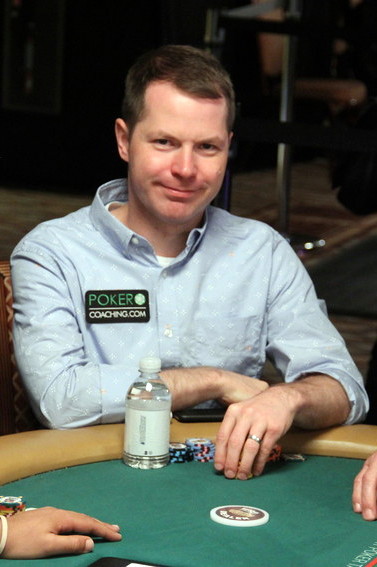






No One Wants To Go Broke Quicklyby Jonathan Little | Published: Jul 26, 2023 |
|
|
 If you want to increase your poker skills and learn to crush the games, check out Jonathan Little’s elite training site at PokerCoaching.com/CardPlayer.
If you want to increase your poker skills and learn to crush the games, check out Jonathan Little’s elite training site at PokerCoaching.com/CardPlayer.
Let’s discuss an interesting hand I played last year in the $1,500 buy-in Monster Stack event at the World Series of Poker. This event is different from other $1,500 events in that each player starts with an overly deep stack. This hand took place early on in the tournament, however, and was actually just the third hand of day 1.
A middle-aged man who I did not know raised to 500 out of his 15,000 stack at 100-200 from middle position. Everyone folded around to me, and I called in the big blind with 4 3
3 .
.
Calling is the only reasonable option, but many tight players opt to incorrectly fold. I strongly suggest that you learn to profitably call in these situations, because being able to continue with a wide range of hands will make you much more difficult to play against compared to if you only play strong hands in an obvious manner.
If you constantly keep your opponents guessing, they will inevitably make mistakes. If they usually know where you stand, they will play well. You profit when your opponents make errors. When they play well, you do not profit.
The flop came A J
J 4
4 , giving me bottom pair and a weak flush draw.
, giving me bottom pair and a weak flush draw.
I checked to my opponent, as I will always do on a board that favors his range, and he bet 700 into the 1,100 pot. I decided to check-raise to 1,700.
If the stacks were a different size, either shallower or deeper, I would likely have called.
If the stacks are shorter, my opponent would be able to reasonably go all-in, forcing me to make a decision for my tournament life with a hand that I know will win roughly 50% of the time. In general, if you have an edge, you want to avoid coinflip scenarios when you are not getting excellent pot odds.
If the stacks were deeper, my opponent could call my check-raise and play well on the turn, folding when the draws complete and calling when they don’t.
With the current stack size, going all-in for my opponent would be a huge overbet, and calling would allow me to put significant pressure on him on the turn by betting again, making all of his options somewhat marginal.
My opponent surprised me by three-betting to 5,000, leaving only 9,500 remaining in his stack.
I was fairly confident that my opponent liked his hand. However, I thought that he could like a strong hand such as A-K or A-Q but still be willing to fold if I pushed all-in. A large amount of the players in this particular tournament traveled great distances to play, and certainly do not want to bust out on the third hand of the day.
I personally did not care if I busted because this event was one of many that I would play throughout the series. For a professional, no individual event is emotionally significant.
This gave me the “courage” to go all-in.
While attempting to bluff someone off a likely strong hand is rarely a good idea, occasionally it makes sense.
My opponent looked disgusted. He asked me a few questions, trying to get a read, but of course I did not reply. He thought for around three minutes before folding A-J (top two pair) face up!
He proceeded to tell me that he knew I got lucky to flop a set and that nobody else at the table would have been able to make such a high-level fold.
Be sure you are not one of these players who thinks you always make the right play. If I thought he had an effectively unfoldable hand like top two pair, I certainly would not have tried this all-in semi-bluff.
When your opponents are looking for a reason to make a big fold, get out of line and induce them to make a huge mistake.
If you want to improve your preflop game even more, I put together a 5-Day Preflop Challenge with the help of Jonathan Jaffe and Matt Affleck. This challenge is completely free inside the Card Player Poker School!
When you join the Card Player Poker School (it’s free to join), you’ll also get:
✔ Free downloadable preflop charts
✔ GTO preflop charts
✔ Video Classes
✔ Interactive Hand Quizzes
✔ Free Course: Master the Fundamentals
✔ Free Course: The 25 Biggest Leaks and How to Fix Them
✔ Free training every week
 Jonathan Little is a two-time WPT champion with more than $7 million in live tournament earnings, best-selling author of 15 educational poker books, and 2019 GPI Poker Personality of the Year. If you want to increase your poker skills and learn to crush the games, check out his training site at PokerCoaching.com/cardplayer.
Jonathan Little is a two-time WPT champion with more than $7 million in live tournament earnings, best-selling author of 15 educational poker books, and 2019 GPI Poker Personality of the Year. If you want to increase your poker skills and learn to crush the games, check out his training site at PokerCoaching.com/cardplayer.
Features
Tournaments
Strategy